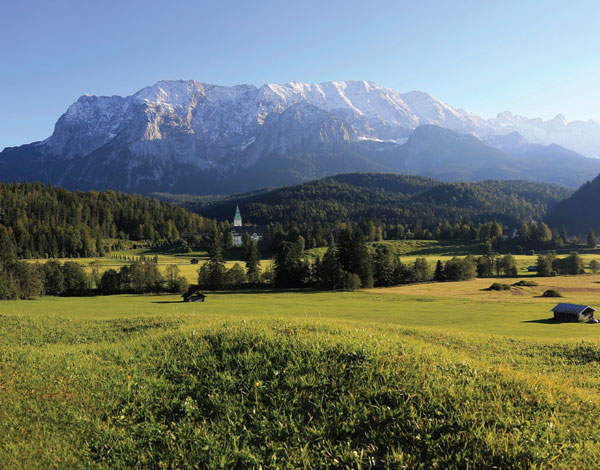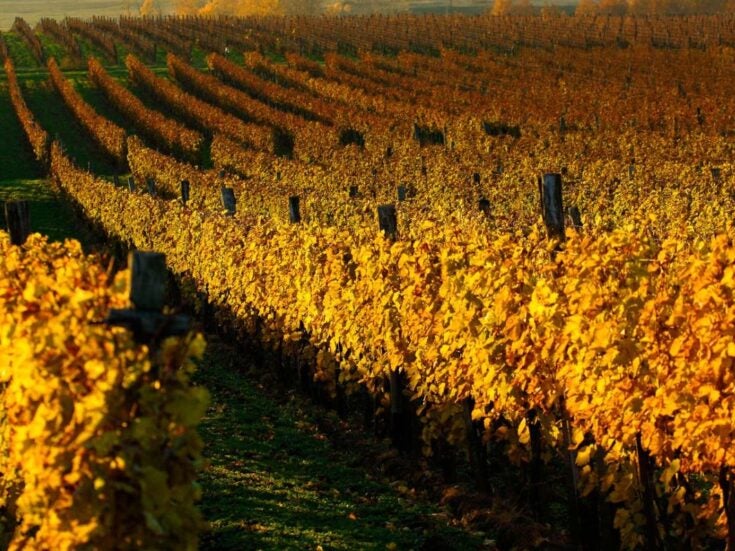

It’s 7am on a winter morning, and I am on the roof. Billows of steam rise from the swimming pool to meet snowflakes as they fall. The familiar, hulking mass of the Wetterstein mountain range is invisible in the white-out, and the fir trees, boughs heavy beneath their icy load, release small avalanches now and then with a shuddering sigh. Cocooned in water heated almost to body temperature, I sniff the cold air and revel in the unearthly suspension of time and place.
Schloss Elmau does that to you. Situated in a remote corner of Bavaria between the 1936 Winter Olympics town of Garmisch and tiny Mittenwald, famed since the 17th century for violin-making, it is an extraordinary place. Extraordinary not for its idyllic location at the foot of the mountains, exceptional spa, Michelin-starred restaurant, or the creature comforts expected of a five-star hotel — but for its cultural and political associations.
In June it will also become a retreat for world leaders, when Schloss Elmau hosts the G7 summit. ‘I really didn’t want to do it,’ says owner-manager Dietmar Müller-Elmau. ‘But Angela Merkel loved the place when she came to give a lecture in 2005, and her chief of protocol arrived at the door to say the chancellor was most insistent…’
We are sitting in the winter garden of the Schloss, sipping white tea. With machine-gun rapidity and disarming openness, Müller-Elmau is talking about the German sense of moral superiority and its application in international affairs. On that subject, he embarks on an exposition of the philosophy of his grandfather, who conceived the Schloss on the eve of World War I.
‘Johannes Müller saw this as a place where people would come to get rid of the “I”, through communion with nature, music and dance,’ he says of the Lutheran theologian, philosopher and passionate opponent of anti-Semitism. ‘He believed the divine could be revealed only by abandoning the “I”, not through any conscious effort or ritual. He criticised the Church, and thought theAnthroposophists were even worse. Only God could save Man.’
People flocked to his lectures, many German Jews among them. He numbered Martin Buber and Adolf von Harnack among his many admirers. Such was the prestige of the gatherings that well-bred daughters of guests paid to work here, hoping to find a suitable husband on the dance floor. Quadrilles, natürlich, were in the name of God.
‘The problem came in 1933, when Johannes Müller politicised his thought, and proclaimed support of Hitler because of his emphasis on the community, at the expense of the individual,’ explains Müller-Elmau. ‘But he also believed that Hitler could only achieve the common good with the help of the Jews… schizoid, yes!’ Still, at Schloss Elmau, the Nazi salute remained banned.
Müller-Elmau, who knew his grandfather only through his writings (he died in 1949), has just completed a book on the troublesome metaphysics of Johannes Müller. Himself a philosopher of a more empirical bent, who also studied business administration and computer science, he invented the Fidelio software for hotels ‘in four months’ during 1987, selling it to Micros Inc nine years later. Micros went from strength to strength and has just been purchased by Oracle for $5.3 billion. ‘I should have kept it,’ he adds wistfully.
Nevertheless, the sale of Fidelio helped fund the modernising of the Schloss when he took over the management of the hotel — amid much family in-fighting — in 1997. ‘My grandfather wanted to create freedom from the “I”, I want to create freedom for the “I”,’ he laughs. ‘I only changed one word!’ Whereas Johannes Müller, ‘who believed that truth was anarchically subjective and could not be the same for two people’, would brook no discussion, even banning Rudolf Steiner from the premises, his grandson’s prepositional shift encourages an open exchange of views.
In tandem with the Schloss’s multilingual and heavyweight bookshop, he has instituted a programme of literary events, political debates and cultural symposia with international figures, generating ideas which have found their way to the Bundestag. ‘We had one discussion, for example, in 1998 about the importance of immigration and freedom of movement for creativity and the economy,’ he says. ‘Two years later, it resulted in the introduction of the Green Card in Germany.’
Then, in August 2005, there was the fire. Two-thirds of the Schloss was destroyed, as well as valuable archives but, despite the difficulties of reconstructing a listed building, it turned out to be a blessing in disguise. Müller-Elmau became majority shareholder of the Schloss itself and was able to fulfil his vision, expanding and repositioning the hotel to reopen as a luxury spa and cultural hideaway in 2007.
He oversaw every detail himself, his choice of decorations and materials — from Andrew Martin elephant-print fabrics to Japanese architectural elements, and the authentic Turkish hammam — reflecting his penchant for ‘adapted eclecticism’. ‘We live in an international society,’ he says. ‘We borrow from each other’s cultures. It is foolish to insist on “the local”.’
Of the original Schloss, only the east wing remains, with its grand central staircase, a few ascetic cell-like bedrooms befitting mortification of the ego and the beautiful first-floor wooden concert hall.
It is perhaps in the shared passion for music that Müller-Elmau most closely resembles his grandfather, but for one detail. ‘He believed music was the breath of God, through man, and that only God could be creative,’ says Müller-Elmau. ‘Concerts were a religious experience; you did not clap at the end.’ From the beginning, musicians of the stature of Wilhelm Kempff performed at Elmau.
The Amadeus Quartet, in 1957, founded the Anglo-German Music society as part of the reconciliation process, inviting ‘all their friends’ — Benjamin Britten, Emil Gilels, Alfred Brendel and Yehudi Menuhin among them. The Wagner clan were regular guests from 1951. Müller-Elmau, who met Gertrud Wagner [widow of Wieland] as a young man, recalls visiting Bayreuth one summer and experiencing a suffocating sense of hero-worship. ‘If you were not a fervent believer,’ he says of his brief visit to the festival, ‘you felt ostracised and isolated. And I realised it was the same thing here.’
Prominent, in fact, among Müller-Elmau’s cultural debates was one held in 1999, on Wagner and the Third Reich. ‘I was interested in the history of National Socialism and in theology. And Wagner was like a religion. For the first and only time, all the most important Wagner critics from around the world, both for and against, were under one roof On television, Schloss Elmau was positioned as the anti-Bayreuth, with Wolfgang Wagner on one side of a split screen and me on the other. But I didn’t care about Bayreuth and Wolfgang Wagner – I was just interested in the history of ideas.’
Well and truly secularised today, the repertoire at Schloss Elmau has been expanded to include jazz and world music, as well as classical chamber concerts and the Verbier Festival on tour — averaging 220 concerts annually. So how does he persuade artists of the renown of Gidon Kremer and the elusive Martha Argerich to come and play in a 250-seat hall? ‘Many artists like to stay here for a few days, rest and see friends,’ he replies. ‘It is very relaxed.’ For the fortunate guests, concerts are part of the package.
The greatest challenge facing Müller-Elmau at present is the preparations for G7. It has taken eight years to obtain planningpermission to build the 47-room Retreat, just 150 metres from the Schloss itself, and builders are working round the clock to ensure it is ready.
‘The Retreat is ideal for G7,’ he says. ‘Not just for its privacy, but because eleven of the suites are of identical size and divide into two groups with identical floor plans.’ That will certainly help the chief of protocol to avoid ruffled feathers in the allocation of nests, and the entire hotel will be closed for the three-week run-up to the two-day event, to avoid inconveniencing regular guests. Meantime, the drive has been torn up to lay secondary cables to cover all conceivable eventualities, rendering every system ‘fault tolerant’. ‘We will end up with the best communications infrastructure in the world,’ he jokes.
It is now after midnight and Müller-Elmau shows no signs of flagging. Tea has long since morphed into dinner at Fidelio, the Schloss’s Italian restaurant. Tomorrow morning he flies to Brussels, to choose furniture for the retreat, while I plan to follow the Königsweg in the hoof-prints of King Ludwig II: a three-hour hike from the hotel up the mountain to Schachen, the least known of his follies. Euphemistically known as a ‘hunting lodge’, its homely exterior conceals a phantasmagorical oriental-style opium den to which the king would retreat for his birthday and smoke his way to bliss.
From philosophers and artists to politicians and mad kings, the genius loci, it seems, entrances all.






